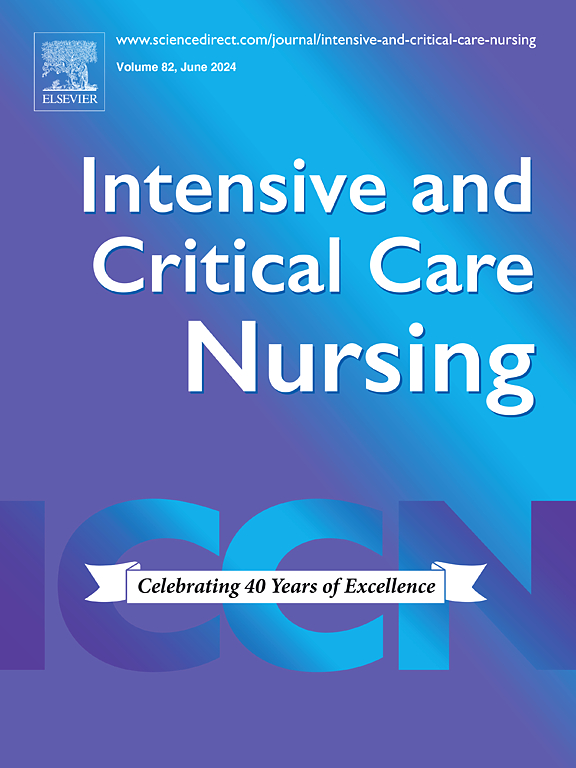"我会摆脱困境的"--重症监护中患者对早期康复的体验。诠释学研究。
IF 4.9
2区 医学
Q1 NURSING
引用次数: 0
摘要
背景:随着人们对重症监护环境中患者体验的了解日益加深,重症监护中早期动员的重要性也变得越来越明显。然而,我们仍然需要更多有关病人复杂经历的知识。因此,本研究旨在深入了解重症监护病房近期接受治疗的患者早期动员的意义和深层含义:方法:采用诠释学、解释学方法进行定性研究。在两家不同的医院对最近在重症监护室接受治疗的 30 名参与者进行了半结构化访谈:分析得出了三个主题:"努力恢复独立和正常生活"、"与医护人员的互动 "和 "在混乱无序的环境中进行早期动员"。第一个主题反映了参与者的经历、动机以及早期动员的深层意义,即希望、康复的开始和奋斗的意愿。其他主题描述了参与者动员的背景和环境,包括与医疗专业人员的合作:结论:在重症监护中,早期动员的意义和深层含义被理解为康复的起点。它能够唤起希望,增强斗志,尤其是当它包括离开病床时。患者之前已经认识到韧性和坚持对于恢复体力和行动能力至关重要,而与医护人员的积极互动也有助于恢复人的尊严并促进参与:实践启示:应利用早期动员来激发重症监护患者的希望和争取康复的意愿。应努力让患者与医护人员进行积极的互动,鼓励他们的斗志并积极参与早期动员。应尽可能多地让患者起床和离开病床。本文章由计算机程序翻译,如有差异,请以英文原文为准。
“I will get out of this” - The patients’ experiences of early mobilisation in intensive care. A hermeneutic study
Background
The significance of early mobilisation in intensive care has become increasingly apparent along with a growing understanding of patient experiences within this critical setting. However, there is still a need for more knowledge regarding the complex experiences of the patients. Therefore, this study aimed to gain an in-depth understanding of the significance and deeper meaning of early mobilisation in patients recently treated in intensive care.
Methods
A qualitative study with a hermeneutic, interpretive approach. Semi-structured interviews were conducted with 30 participants recently treated in the intensive care units, in two different hospitals.
Findings
The analysis yielded three themes: ‘Struggling to regain independence and normal life’, ‘Interaction with healthcare professionals’ and ’Early mobilisation in a chaotic, confused context without control’. The first theme captures the participants’ experiences, motivations, and the deeper significance of early mobilisation, which was hope, the beginning of recovery and a willingness to fight. The other themes describe the context and circumstances surrounding the participants’ mobilisation including the collaboration with healthcare professionals.
Conclusion
Early mobilisation’s significance and deeper meaning in intensive care were understood as the starting point of recovery. It had the ability to evoke hope and strengthen the fighting spirit, especially when it included leaving bed. The patients’ pre-existing understanding that resilience and persistence were crucial for regaining strength and mobility contributed, as well as positive interactions with healthcare professionals that restored human dignity and facilitated involvement and participation contributed.
Implications for practice
Early mobilisation should be used to inspire hope and a willingness to fight for recovery in patients treated in intensive care. Efforts should be made to engage patients in positive interactions with healthcare professionals that encourage this fighting spirit and active participation in early mobilisation. Mobilisations involving patients getting up and leaving bed should be used as much as possible.
求助全文
通过发布文献求助,成功后即可免费获取论文全文。
去求助
来源期刊

Intensive and Critical Care Nursing
NURSING-
CiteScore
6.30
自引率
15.10%
发文量
144
审稿时长
57 days
期刊介绍:
The aims of Intensive and Critical Care Nursing are to promote excellence of care of critically ill patients by specialist nurses and their professional colleagues; to provide an international and interdisciplinary forum for the publication, dissemination and exchange of research findings, experience and ideas; to develop and enhance the knowledge, skills, attitudes and creative thinking essential to good critical care nursing practice. The journal publishes reviews, updates and feature articles in addition to original papers and significant preliminary communications. Articles may deal with any part of practice including relevant clinical, research, educational, psychological and technological aspects.
 求助内容:
求助内容: 应助结果提醒方式:
应助结果提醒方式:


